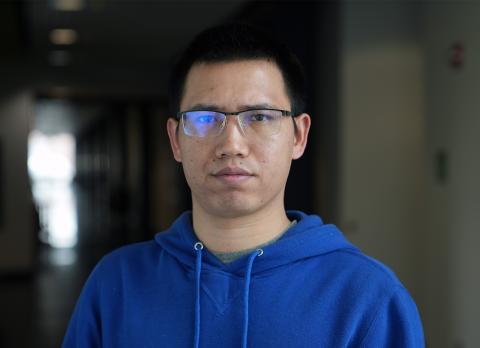
Qian Liu is a Ph.D. student studying chemistry with a focus in organic chemistry and materials science. His hometown is Xinyu City in China, and he graduated with a B.E. in pharmaceutical engineering from Changzhou University.
1. Why did you choose UNH for your graduate program?
As an R1 University, UNH is at the forefront of research and innovation and provides state-of-the-art equipment and facilities. The professors are knowledgeable and supportive and always inspire us to apply what we have learned and do original research.
2. What is your Research Focus?
My research focus is on “Design, Synthesis and Characterization of New, Small Organic Semiconductors.” We can control the molecular structures via molecular engineering and chemistry modification to adjust their photophysical and electrical properties for applications in organic optoelectronic devices.
3. What are you hoping to accomplish with this research? How will it potentially impact society or day-to-day life?
I'm hoping to develop a series of small HOMO-LUMO gaps, high stability, and good solubility organic semiconductor materials. These materials are useful for low-cost, large-scale, printable, flexible electronic devices, such as organic field-effect transistors (OFETs), organic light-emitting diodes (OLEDs), organic photovoltaics (OPVs), organic photodetectors (OPDs), and organic sensors.
4. What do you enjoy most about your experience at UNH?
I enjoy the academic seminars and general workshops that UNH provides, along with the fun events and activities at the MUB where I can meet students from all over the world with different cultural backgrounds.
5. What do you hope to do after your time at UNH?
Upon completing my studies, my aspiration is to embark on a career within the life science industry. My goal is to engage in research and development activities aimed at creating pharmaceutical drugs that will positively impact human health and well-being.
6. What is your advice for someone on how to best prepare for a graduate program?
From my perspective, it's crucial to strengthen your academic foundation by reviewing and enhancing your knowledge in relevant subjects, seek opportunities to collaborate with professors and peers to gain a deeper understanding of your field, and sharpen your critical thinking and problem-solving abilities through research activities and academic seminars. Lastly, prioritize time management and organizational skills to balance coursework, research, and personal commitments.